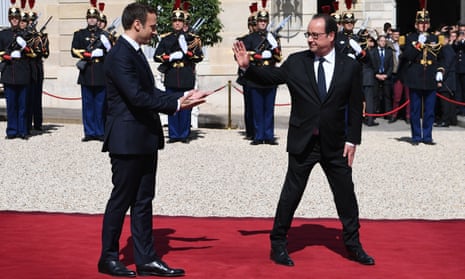Emmanuel Macron has announced the closure of the École Nationale d’Administration, the elite French finishing school for the country’s leaders, where he himself studied.
Known as ENA, the grande école has been the hothouse for France’s top civil service and a pathway to power in the public and private sectors. Four French presidents, including Macron, have passed through its doors as have dozens of ministers and business leaders.
Founded by Gen Charles de Gaulle in October 1945 with the idea of breaking the upper-class hold over France’s higher echelons, ending nepotism and making the civil service more democratic, it has instead become a byword for an establishment elite and been accused by critics of encouraging groupthink.
Macron told a gathering of state officials, including ambassadors, prefects – and a number of énarques, as graduates of the school are called – that it would be replaced by a new establishment called the Institute for Public Service (ISP). However, potential students would still be required to pass a tough entrance exam and follow a specific study syllabus.
Another change will mean that the top-ranking graduates will no longer have automatic access to the best administrative jobs until they have shown their worth in other official roles.
“The field is the first skill expected of state administrators,” an Elysée source said. “This decision puts an end to the job-for-life that has been the case until now. “Civil servants will not be permanently assigned to a function, a body or a sector.”
Another objective, the Elysée source said, is to make the senior civil service more attractive. “The state must continue to attract the best,” the source said.
The school was originally located in Paris but moved to Strasbourg, though it keeps a campus in the capital.
While the number of students from privileged families was 45% in the 1950s and 60s, this had risen to about 70% between 2005 and 2014, while those from working-class families fell to about 6%.
Macron’s decision to shut ENA was reportedly prompted by the gilets jaunes protest movement that began in 2018 and was sparked by a sense that the country’s leaders were out of touch with ordinary French people, especially those living outside the cities.
The text of a speech the president never delivered because it was postponed when Notre Dame Cathedral caught fire, was leaked to the French press in 2019. In it Macron said: “If we want to build a society of equal opportunity and national excellence, we must reset the rules for recruitment, careers and access to the upper echelons of the civil service. That’s why we will change the system of training, selection and career development by doing away with ENA and several other institutions.
“Do the upper echelons of our public service reflect our society? No …”
De Gaulle’s aim of installing more égalité in French higher education was never realised and a 2015 study from the European Centre For Sociology And Political Science to mark its 70th anniversary stated: “However it is calculated, the intake has not democratised during the last 70 years.” It concluded that the ENA founders’ dream had not been realised, while conceding that one point in ENA’s favour was that the number of female students had risen to 45%.
ENA officials have pointed out that the school’s socioeconomic profile is better than at some of France’s other elite higher education establishments, but critics have also attacked ENA as an echo chamber that trammels students along intellectually conformist positions.
Peter Gumbel, a British academic, has claimed that France’s grande école system, and especially the ENA, has the effect of perpetuating an intellectually brilliant yet out-of-touch ruling elite.
Although ENA has some high-profile alumni, the majority of its graduates are, as the school says, “largely unknown, lead quiet and useful careers in our civil service and don’t recognise themselves in the stereotypical images given about the school”.
In February 2020, Macron’s then prime minister, Édouard Philippe, suggested that it would be replaced by a “public administration school”.
French media reported that a new school would aim to attract a more socially diverse range of students, who would follow a course more in touch with modern life that included subjects such as laîcité – France’s version of secularism – poverty, ecology and sciences.
Students wishing to enter ENA take a competitive exam, usually after graduating from another of the country’s grandes écoles, involving essays on public law, economics, the role of public institutions in society and must show an understanding of public finances. An oral exam includes questions on European and international politics.
After a two-year study programme, ENA students are ranked by their results. The academic year is known as a promotion; graduation is ranked from one to 100 on their results. They are then asked, in order of merit, what job they would like. The best students usually join the Council of State, Financial Inspectorate and Court of Auditors, while those lower down the rankings enter less prestigious civil service jobs.
Famous alumni

Presidents Valéry Giscard d’Estaing, Jacques Chirac, François Hollande and Emmanuel Macron.
Prime ministers Jean Castex, Édouard Philippe, Dominique de Villepin, Lionel Jospin, Laurent Fabius, Alain Juppé, Édouard Balladur, Michel Rocard.
Current ministers Florence Parly (Armies Minister) and Bruno Le Maire (Finance Minister).
Business leaders Bernard Lathière (Airbus), Jean-Cyril Spinetta (PDG – Air France/KLM, Henri de Castries (AXA), Guillaume Pepy (SNCF), Stéphane Richard (France Telecom).
International figures Pascal Lamy (ex European Commissioner, DG of the WTO), Jean-Claude Trichet (ex governor of the Bank of France and the European Central Bank).
Foreign leaders Nicéphore Soglo (Benin), Adly Mansour (Egypt), Paul Biya (Cameroon).
